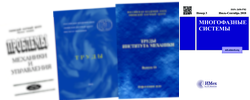

The article is devoted to the analysis of the application of modern methods of automation of work with scientific documents using intelligent machine learning systems. The paper highlights the importance of these approaches for solving urgent problems in various scientific fields. The article examines the key problems that require an integrated approach to solving, and describes promising areas for further research. A methodology for improving automation efficiency is proposed, in which special attention is paid to hybrid systems that combine expert assessments, algorithmic solutions and neural network models to increase automation efficiency. The continuous growth of computing power contributes to the development of these technologies and the expansion of their practical application. The results obtained can be used in optimizing чproduction automation processes, as well as in the development of scalable systems based on modern artificial intelligence technologies.
document processing automation,
machine learning,
expert assessments,
scientific papers,
neural networks,
natural
language processing (NLP),
linguistic text processing,
classification,
hybrid methods
The proposed article describes a hybrid approach to automating the processing of scientific and technical documents in a research institute, which combines a multi-input neural network architecture and the integration of linguistic methods. Such methods can significantly optimize document processing processes - accelerate information extraction and reduce the proportion of errors at the first stages of data processing, which ultimately has an exponentially positive effect on all subsequent stages of working with scientific documents. The paper notes the importance of these approaches for solving urgent problems in various scientific fields.
The article considers key problems that require an integrated approach to solution, and describes promising areas for further research. A methodology for improving the efficiency of automation is proposed, in which special attention is paid to hybrid systems that combine expert assessments, algorithmic solutions and neural network models to improve the efficiency of automation.
The continuous growth of computing power contributes to the development of these technologies and the expansion of their practical application. The results obtained can find application in optimizing production automation processes, as well as in the development of scalable systems based on modern artificial intelligence technologies. The relevance of using AI in working with scientific documents is due to several factors. Firstly, the continuous increase in the volume of scientific and technical information requires the creation of automated systems capable of promptly processing data, which has already been reflected in a number of modern research and developments. Thus, many research teams and technology companies, such as Google Scholar, Elsevier, Springer Nature, as well as leading universities, are actively developing and implementing machine learning algorithms for classification, citation analysis and identifying thematic trends. Secondly, the automation of routine processes allows reducing the time for preparing and processing information, which is especially important for specialists in the field of scientific research, librarians and analysts working with large databases. The areas of application of such solutions are very diverse. They cover both scientific research activities and educational processes, management of library collections, information support for scientific projects and monitoring of innovative technologies. The use of intelligent systems allows for a quick and accurate search for relevant information, optimizes peer review processes and even helps identify new areas of research. Thus, the development and implementation of methods for automating the processing of scientific documents is becoming a necessity for universities, research institutes, publishers and organizations involved in the analysis of scientific trends.
As a result, the integration of interdisciplinary methods and technologies in the field of automation of work with scientific documents opens up broad prospects for further research. The use of deep neural network models in combination with ensemble analysis methods and expert assessments contributes to the creation of adaptive systems capable of self-correction and learning based on new data. Standardization of processes and intersectoral cooperation will become key factors for improving the efficiency of scientific document management and the quality of information analysis in the future.
The use of a hybrid approach to automating processes for working with scientific documents, which includes a model for representing document clusters, a hybrid approach should provide a significant increase in processing accuracy. The use of the described approach opens up opportunities for automating the analysis of large volumes of data, minimizing errors associated with manual input, and increasing the transparency of scientific work.
